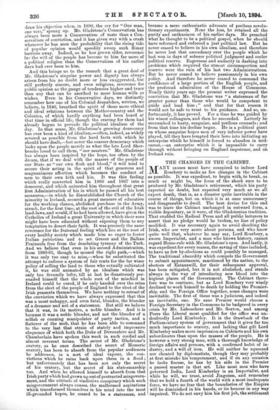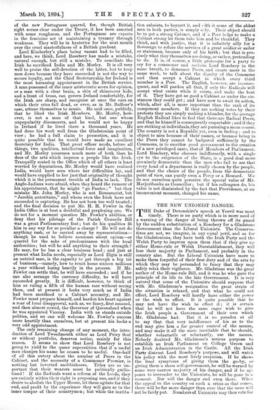THE CHANGES IN THE CABINET.
MANY causes must have conspired to induce Lord Rosebery to make as few changes in the Cabinet as possible. It was expedient, to begin with, to break, as much as might be, the force of the shock sure to be produced by Mr. Gladstone's retirement, which his party expected no doubt, but expected very much as we all expect death, that is, as a disaster quite inevitable in the course of things, but on which it is at once unnecessary and. disagreeable to dwell. The best device for this end was to leave the Cabinet unchanged in outward form, a visible depositary, as it were, of the Gladstonian tradition. That enabled the Radical Press and all public lecturers to assert that no pledge would be broken, no line of policy modified. It was necessary again to avoid shocking the Irish, who are very acute about persons, and who know quite well that, whatever he may say, Lord Rosebery, a sworn Imperialist, and a man who knows history, cannot regard Home-rule with Mr. Gladstone's eyes. And lastly, it was expedient for every reason, the saving of time included, to have as few by-elections as could possibly be managed, The traditional absurdity which compels the Government to submit appointments, sanctioned by the nation, to the electors of Eatanswill, for their subsequent approval, has been mitigated, but it is not abolished, and stands always in the way of introducing new blood into the highest places of the Government. The Cabinet there- fore was to continue, but as Lord Rosebery very wisely declined to work himself to death by holding the Premier- ship and. the Foreign Office together, some changes were inevitable. The first of these was a judicious, and indeed an inevitable, one. No sane Premier would choose a Foreign Secretary in the Commons to be badgered in every crisis by Mr. Labouchere and. Mr. Sexton, and. among Peers the Liberal most qualified for the office was un- doubtedly Lord. Kimberley. It is the drawback of the Parliamentary system of government that it gives far too much importance to oratory, and lacking that gift Lord Kimberley makes more impression on Cabinets and his own subordinates than upon the masses of the people. He is however a very strong man, with a thorough knowledge of foreign affairs and persons, with a confirmed habit of in- dustry, and a will of iron. He will neither be squeezed nor cheated by diplomatists, though they may probably at first mistake his temperament, and if on any occasion he lacks finesse, he has by his side in the Premier a passed master in that art. Like most men who have governed India, Lord Kimberley is an Imperialist, and while he will, we trust, avoid Jingoism, and remember that we hold. a fourth of the world with a most inadequate force, we have no fear that the boundaries of the Empire will be diminished in his hands, or its honour in any way impaired. We do not envy him his first job, the settlement of the new Portuguese quarrel, for, though British right seems clear under the Treaty, it has been asserted with some roughness, and the Portuguese are experts in the feminine art of maintaining a tyranny through weakness. They will be in hysterics for the next month over the cruel masterfulness of a British gunboat.
Lord Kimberley's place being vacant had to be filled, and here, we think, Lord Rosebery has made a mistake, natural enough, but still a mistake. To conciliate the Irish he sacrificed India and Mr. Morley. It is all very well to praise the self-devotion of the latter, but to keep men down because they have succeeded is not the way to secure loyalty, and the Chief Secretaryship for Ireland is the most harassing appointment in the British service. A man possessed of the inner aristocratic scorn for opinion, or a man with a clear brain, a skin of rhinoceros hide, and a front of brass, can govern Ireland comfortably, for the Irish are sharp, and recognise at once the ears on which their cries fall dead, or even, as in Mr. Balfour's case, attune themselves to music. He said once, publicly, that he liked the Irish Members. Mr. Morley, how- ever, is not a man of that kind, but one whom unpopularity disconcerts, and he would not be happy in Ireland if he lived there a thousand years. He had done his work well from the Gladstonian point of view ; he had a full claim to promotion, and it is quite possible that he would have made an excellent Secretary for India. That great officer needs, before all things, two qualities, intellectual force and imagination, and Mr. Morley possesses much more of both than he does of the arts which impress a people like the Irish. Tranquilly seated in the Office which of all others is least worried by deputations, Mr. Morley would have realised India, would have seen where her difficulties lay, and would have supplied to her just that originality of thought which it is the permanent trouble of India to lack. The Anglo-Indians were afraid, when they heard the rumour of his appointment, that he might "go Fantee ; " but they mistake Mr. John Morley, who is not Rousseauist, but "Jacobin autoritaire," and whom even the Irish have not succeeded in capturing. He has not been too well treated ; and the final decision to put Mr. H. H. Fowler in the India Office is at best a doubtful and perplexing one. We do not for a moment question Mr. Fowler's abilities, or deny that his pilotage of the Parish Councils Bill was a great Parliamentary feat ; but do his qualities fit him in any way for so peculiar a charge ? He will not do anything rash, or be carried away by representations— though he used to believe nonsense about opium—or quarrel for the sake of predominance with the local authorities ; but will he add anything to their strength ? He may, for he has a clear business head ; and just at present what India needs, especially as Lord Elgin is still an untried man, is the capacity to get through a big bit of business,—namely, how to remit home sixteen millions a year without losing heavily in the process. If Mr. Fowler can settle that, he will have succeeded ; and if he can also arrange the currency difficulty, he will have succeeded greatly. It is difficult, however, to think of him as ruling a fifth of the human race without seeing them, and at present it looks very much as if India had been sacrificed to a Cabinet necessity, and Mr. Fowler must prepare himself, and harden his heart against a roar of local disapproval, sach as, we fancy, first amazed, and then almost cowed, the Governor of Queensland when he was appointed Viceroy. India with us stands outside politics, and no one will welcome Mr. Fowler's success more heartily than ourselves, but at present his looks a very odd appointment.
The only remaining change of any moment, the intro- duction of Lord Tweed mouth either as Lord Privy Seal or without portfolio, deserves notice, mainly for this reason. It seems to show that Lord Rosebery is not going to yield to the queer superstition that if a useful man changes his name he ceases to be useful. One-half of all this outcry about the number of Peers in the Cabinet, and the necessity of a Commoner Premier, is nothing but inverted snobbishness. Titles are so im- portant that their wearers must be politically guillo- tined! If the Radicals want a reform of the Lords, they are entirely within their right in proposing one, and it they desire to abolish the Upper House, let them agitate for that end, and profit by the experience they will gain as to the inner temper of their countrymen; but while the institu- tion subsists, to boycott it, and with it some of the ablest men in both parties, is simply silly. Their object should be to get a strong Cabinet, and if a Peer helps to make a Cabinet strong let them take him and be thankful. They think, and with justice, that it is infinitely silly for a Sovereign to refuse the services of a great soldier or sailor or statesman, because only of his birth ; but that is pre- cisely what they themselves are doing, or rather, pretending to do. It is, of course, a little grotesque for a party to cry for a commoner and acclaim Lord Rosebery in the same breath, to denounce Peers, and create more in the same week, to talk about the dignity of the Commons and then accept a Cabinet in which every third member is a Peer. The English, however, are inconse- quent, and will pardon all that, if only the Radicals will accept what exists while it exists, and make the best of it. They have got as good a Cabinet as under the cir- stances they could get ; and have now to await its action, which, after all, is more important than the rank of its component members. If they are seeking votes by their protests they are simply making a blunder, for the average English Radical likes to feel that there are Radical Peers, and that he himself is consequently respectable ; and if they are striking at individuals, they are pursuing a mean course. The country is not a Republic yet, even in feeling ; and to object to men because of their names, or because being in the Peers they cannot be badgered sufficiently by the Commons, is to sacrifitv good government to the creation of a new privileged caste, that of Members of Parliament. Lord Rosebery, who chooses indifferently, with a single eye to the exigencies of the State, is a good deal more genuinely democratic than the men who fail to see that every head of a department is really chosen by the people, and that the choice of the people, from the democratic point of view, can purify even a Percy or a Howard. We do not ourselves quite perceive the special value of Mr. Marjoribanks as Councillor; but if his colleagues do, ilia value is not diminished by the fact that Providence, at an inconvenient moment, changed his name.







































 Previous page
Previous page